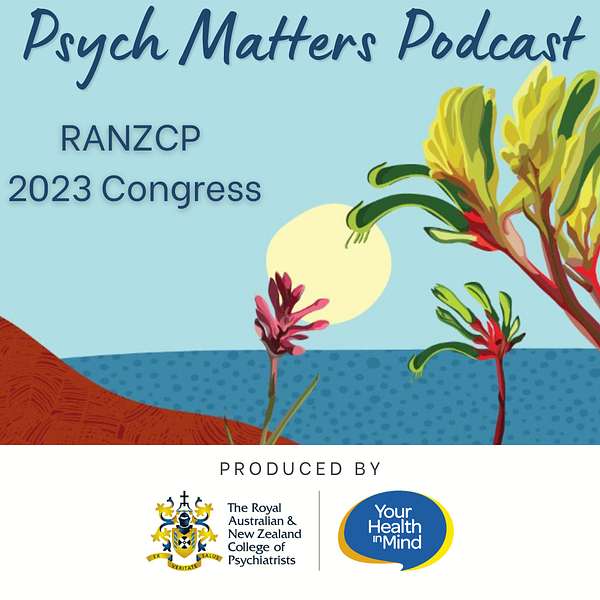
Psych Matters
Psych Matters is an informative and educational podcast by The Royal Australian and New Zealand College of Psychiatrists. Psych Matters provides regular interesting topics for psychiatrists, psychiatry trainees and others with an interest in psychiatry.
Disclaimer:
This podcast is provided to you for information purposes only and to provide a broad public understanding of various mental health topics. The podcast may represent the views of the author and not necessarily the views of The Royal Australian and New Zealand College of Psychiatrists ('RANZCP'). The podcast is not to be relied upon as medical advice, or as a substitute for medical advice, does not establish a doctor-patient relationship and should not be a substitute for individual clinical judgement. By accessing the RANZCP's podcasts you also agree to the full terms and conditions of the RANZCP's Website - RANZCP Website Terms of Use Agreement
Expert mental health information and finding a psychiatrist in Australian or New Zealand is available on the RANZCP’s Your Health In Mind Website - Your Health In Mind
Psych Matters
Perspectives on psychedelic-assisted psychotherapy in clinical practice
In this episode, Professor Richard Harvey is in conversation with Professor David Castle (University of Tasmania) and Associate Professor Lynette Averill (Baylor College of Medicine, Houston and Yale School of Medicine) to discuss their perspectives on psychedelic-assisted psychotherapy in clinical practice.
Professor Richard Harvey has been a consultant psychiatrist since 1998. He trained in the UK and migrated to Australia in 2003. He has held a variety of clinical positions in public and private in Australia. He is a Clinical Professor at Deakin University and is currently in private practice. He is the Chair of the RANZCP Psychedelic-Assisted Therapy Steering Group and he is also the Chair of the RANZCP Committee for Continuing Professional Development.
Professor David Castle is a part of the Department of Psychiatry, The University of Tasmania; and Co-Director, Tasmanian Centre for Mental Health Service Innovation. He has wide clinical and research interests, encompassing schizophrenia and related disorders, bipolar disorder, OCD spectrum disorders and disorders of body image. He has a longstanding interest in the impact of licit and illicit substances on the brain and body, and is actively engaged in programmes addressing the physical health of the mentally ill and the mental health of the physically ill. He has published widely in the scientific literature and is a frequent speaker at scientific meetings.
Associate Professor Lynnette A. Averill is a clinical research psychologist at the U.S. Department of Veterans Affairs and National Centre for PTSD and a professor of psychiatry at Baylor College of Medicine and Yale University Department of Psychiatry. Associate Professor Averill studies the diagnostic and therapeutic potential of psychedelic medicine in PTSD, including glutamate-modulating ketamine and serotonergic psilocybin and MDMA, and their role in mechanistically intervening synaptic connectivity, which subsequentially manifests in behavioural, mood, and cognitive changes. Centred in a humanistic perspective, her studies have found that psychedelic medicines are particularly effective in addressing suicidality, guilt, shame, blame, and forgiveness.
Resources
For guidance regarding psychedelic-assisted therapy see Psychedelics | RANZCP
Topic suggestion:
If you have a topic suggestion or would like to participate in a future episode of Psych Matters, we’d love to hear from you.
Please contact us by email at: psychmatters.feedback@ranzcp.org
Disclaimer:
This podcast is provided to you for information purposes only and to provide a broad public understanding of various mental health topics. The podcast may represent the views of the author and not necessarily the views of The Royal Australian and New Zealand College of Psychiatrists ('RANZCP'). The podcast is not to be relied upon as medical advice, or as a substitute for medical advice, does not establish a doctor-patient relationship and should not be a substitute for individual clinical judgement. By accessing The RANZCP's podcasts you also agree to the full terms and conditions of the RANZCP's Website. Expert mental health information and finding a psychiatrist in Australia or New Zealand is available on the RANZCP’s Your Health In Mind Website.